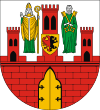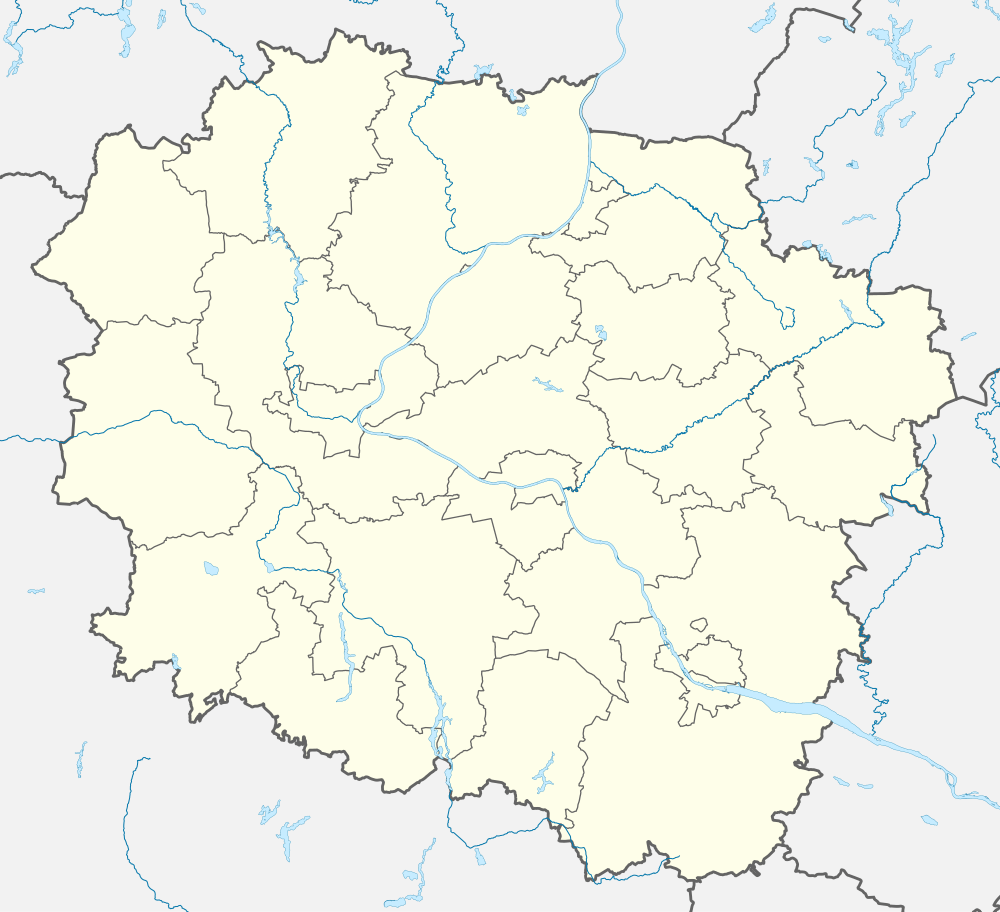Brześć Kujawski
Brześć Kujawski [ˈbʐɛɕt͡ɕ kuˈjafskʲi], often anglicized to Kuyavian Brest, is a town in the Kuyavian-Pomeranian Voivodeship of Poland. Once a royal seat of Kuyavia, the town has been the seat of one of two small duchies into which Kuyavia has been temporarily divided. According to a census done on 31 December 2010, the town has a population of 4,603.[1]
Brześć Kujawski | |
|---|---|
Town hall designed by Enrico Marconi | |
 Coat of arms | |
 Brześć Kujawski  Brześć Kujawski | |
| Coordinates: 52°36′18″N 18°53′53″E | |
| Country | |
| Voivodeship | |
| County | Włocławek |
| Gmina | Brześć Kujawski |
| Area | |
| • Total | 7.04 km2 (2.72 sq mi) |
| Population (2006) | |
| • Total | 4,522 |
| • Density | 640/km2 (1,700/sq mi) |
| Postal code | 87-880 |
| Website | Office website |
The name Brześć comes from the word Brzost, which is a species of elm that the area was originally covered in, while the name Kujawski is derived from the region of Kuyavia and was assigned to distinguish the town from Brześć Litewski, the capital of the Brest Region.[2]
History
The earliest traces of Brześć Kujawski date back to Neolithic settlements, but it wasn't until the thirteenth century that the area became of significant importance as it was the site of a stronghold that was the seat of the Dukes of Kuyavia. In 1250, the town was granted though it has changed several times.
The earliest written mention of the town dates back to 23 April 1228, when a ceremony took place in Brześć granting the land to the Teutonic Order by Konrad I of Masovia. It was a temporary deal, which included four villages and the Dybów Castle. However, the relationship quickly deteriorated, leaving a significant impact on the people of Brześć as well as the surrounding lands. By 1308, the first dangerous feud broke out in Gdańsk and Pomerania between Władysław I the Elbow-high and the Order.
On 10 February 1321, the verdict was read in Brześć Papal Order ordering the return of land stolen by Pomerania. However, crusaders rejected the order only for Brześć to rejoin the country during military campaigning a year later. The city came back under Polish rule under peace treaty in Kalisz in 1343. Despite this, Brześć remained under the threat of raids for nearly 100 years, which occurred several times, even after the Battle of Grunwald. The last time the Crusaders laid siege to Brześć was in 1431 without winning it this time.
During the fourteenth century, Brześć was the capital of the region, which, after the Union of Lublin, was renamed Brzesko-kujawskie. It existed under this title until the time of partition.
Throughout the period of the wars with the Teutonic Order, Polish kings often visited the city either during the run of the Teutonic Knights, fights, or other systems. The Teutonic-Polish conflict ended in 1435 with the signing of the Peace of Brześć Kujawski. The Thirteen Years' War was fought outside the grounds of Brzesko-kujawskie.

In the sixteenth and seventeenth centuries, Brześć was the center of the grain trade that declined the Swedish wars. On 23 April 1782, Stanisław August Poniatowski granted a privilege to the town's Jewish population that allowed them to build houses on street specifically for those of the Jewish religion.[3] The city then became under Prussian rule in 1793, followed by rule from the Duchy of Warsaw in 1807, and rule by the Polish Kingdom in 1815. During the Nazi occupation in World War II, the town was quickly overrun by the Wehrmacht and renamed Brest-Kujawien (1939-1942).[2] As German forces invaded the USSR, the Brest Ghetto was established as one of the many Jewish ghettos in German-occupied Poland. When the ghetto was liquidated, the town was reestablished as Brest (Wartheland) (1943-1945) until it was liberated by the Red Army in 1945 and reunited as part of Poland.
References
- "Stan i struktura ludności oraz ruch naturalny w przekroju terytorialnym". Główny Urząd Statystyczny. 10 June 2011. Archived from the original on 27 November 2011. Retrieved 20 November 2012.
- Stężewski, Daniel. "City Name". Brest Kujawski - Unofficial City. Retrieved 17 October 2016.
- "Brześć Kujawski". Virtual Shtetl. Archived from the original on 24 September 2015. Retrieved 20 November 2012.
External links
- Official website of Brześć Kujawski